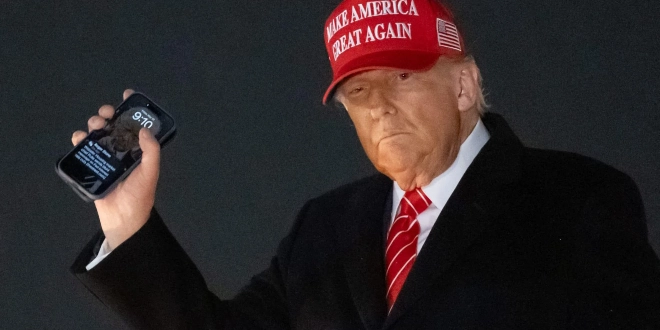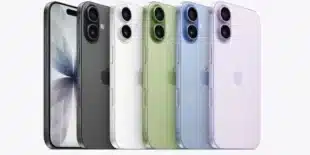The Trump Organization has announced a new business initiative in the consumer technology space, introducing a mobile phone service called Trump Mobile and a branded smartphone named the T1. Both products are scheduled to become available in September, marking the family’s most extensive move yet into the telecommunications and electronics sectors.
The new mobile plan, labeled “The 47 Plan” in a reference to Donald Trump’s aspirations to serve as the 47th President of the United States, will be priced at $47.45 per month. It offers users unlimited voice, text, and data services, along with added features such as roadside assistance and access to telehealth and pharmacy services. These additions place the offering at a higher price point compared to similar plans on the market.
The T1 smartphone, which carries a suggested retail price of $499, is described as having a gold exterior engraved with an American flag. Promotional materials highlight that the device is “designed and built in the United States,” a claim central to its branding. The phone is being marketed toward consumers with a preference for U.S.-made goods and those aligned with conservative political values.
Device Specifications and Manufacturing Controversy
According to information available on the Trump Organization’s website, the T1 will run Android 15 and feature a 6.8-inch AMOLED display, a 50-megapixel main camera, a 16-megapixel front-facing camera, 12GB of RAM, and 256GB of storage expandable via microSD. It will also include a 5,000 mAh battery, in-display fingerprint scanning, and a traditional headphone jack—hardware options that differentiate it from leading devices like the iPhone 16 Pro Max.
The company claims that the T1’s performance will rival flagship smartphones that typically cost twice as much. The device is expected to run on the same national networks used by major U.S. carriers, although the Trump Organization has not disclosed which telecom infrastructure partner will support its service. Similarly, technical specifications regarding the processor—a core component influencing speed and efficiency—have not been detailed.
One of the most debated aspects of the announcement involves the phone’s place of manufacture. The Trump Organization’s press release states that the T1 is produced in facilities located in Alabama, California, and Florida. However, several industry analysts have raised doubts about the feasibility of full-scale domestic smartphone production.
Experts point out that nearly all high-end mobile device components—such as displays, processors, and camera modules—are currently manufactured in Asia, particularly in countries like China, Taiwan, Japan, and South Korea. The United States lacks both the infrastructure and supply chain integration required for complete in-country production. Academic assessments suggest that building such a capacity would require several years and billions of dollars in capital investment.
Eric Trump acknowledged during a recent interview that initial production may not be fully U.S.-based, though he emphasized that establishing domestic manufacturing remains a strategic objective for the company. He reiterated a commitment to bringing future production entirely within the United States.
Ethical Considerations and Market Positioning
The debut of Trump Mobile has reignited public debate over potential conflicts of interest, particularly given Donald Trump’s active political role. Some critics argue that consumers or companies might use subscription services or product purchases as a means to gain favor with the former president, who is pursuing another term in office. This concern echoes previous scrutiny of Trump-affiliated business ventures that have continued during and after his presidency.
The Trump Organization has clarified that the wireless service and associated products are operated through a licensing agreement and are not directly managed by Donald Trump or members of his immediate family. Despite this, concerns about financial benefit and the appearance of self-promotion remain.
From a pricing perspective, Trump Mobile’s monthly plan is positioned at a premium relative to competing offerings in the virtual carrier space. For example, services such as Mint Mobile and Visible provide unlimited data plans at prices as low as $25 to $30 per month. The Trump plan’s higher cost may reflect its added features and branding strategy, but could limit its competitiveness in a price-sensitive segment of the market.
The U.S. telecom industry is dominated by major players like Verizon, T-Mobile, and AT&T. Smaller carriers operating under mobile virtual network operator (MVNO) models have managed to secure niche audiences by reselling access to larger networks. Companies like Mint Mobile, which was acquired by T-Mobile for $1.35 billion in 2023, demonstrated that with targeted branding and competitive pricing, new entrants can gain market share.
Trump Mobile appears to be targeting a similarly defined user base—primarily those loyal to Donald Trump and receptive to the patriotic themes used in the product’s marketing. Promotional efforts have emphasized American values, conservative alignment, and nationalist imagery, likely aiming to convert political support into consumer adoption.
As with previous Trump-branded consumer products—from apparel and fragrances to beverages and real estate—the long-term viability of Trump Mobile may hinge more on brand loyalty than on technical performance or market innovation. The outcome of this telecommunications initiative will likely offer another measure of the Trump brand’s commercial resilience.


